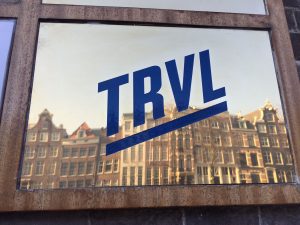Jochem Wijnands has been around in the Dutch startup scene for a while. You may remember Prss, which was acquired by Apple. At the moment he’s active with TRVL, he will share his insights and learnings about life after acquisition and starting a new business.
Could you please introduce yourself a little: who are you, what’s your experience and current role in the (Dutch) startup industry?
I started TRVL in 2010, together with Michel Elings. It was the first iPad exclusive magazine in the world and it quickly became successful. However, the Adobe publishing software we had to use because no other tools were around, truly sucked. There was no publishing software to publish directly to mobile. So we decided to build it ourselves. Everything, from design, to metrics, to monetizing, to publishing, to text rendering, to file compression, which we renamed to Prss. It took us a year. When it was ready, we decided to turn in into a platform. That took us another year. In 2014 we got acquired by Apple. The full team moved to Cupertino where it help built Apple News.
It’s been a while since you started TRVL and you’ve made a few pivots. Why did you made the changes into the current TRVL?
TRVL was still just a magazine on iPad when I came back from my time at Apple. Being a digital publisher isn’t great, it is simply not enough. The only way to monetize is ads and content marketing. You won’t please your readers that way. I was looking for ways to add value for our readers, instead of using them to create a marginal business. So I pivoted TRVL to a peer-to-peer travel booking platform. It’s lifting the veil on the secrets of the travel industry. We pay travellers a travel agent commission on every booking they make. We give you access to spectacular discounts up to 65% – you won’t find these ANYWHERE else. And we’re working on peer-based travel advice during the booking process, to make better decisions where to stay and what to do, and to save time. We use our publishing assets for up funnel user acquisition. And thereI think is the future: transparency for the user, in our case the traveler. Taking out the middle men, on demand economy, a platform businesses. All part of TRVL today. Some of the smaller travel agencies actually started using TRVL, because the get better commissions and save time. It simply works better than the assortment of tools they are using today.
How do you think TRVL affects travel agents?
I don’t think TRVL will kill the travel agent. Other forces will. If you book your trip online today, there are no travel agents to help you. So you have to do all the work yourself. TRVL is recognising this in two ways. 1. we reward you for it by paying you a travel agent commission. and 2. we’re using the experience of millions of travelers and we’re making all this knowledge available during the booking process. So if you want to go to Madrid and you have never been there, you can either chat with somebody very similar to you, who has local experience in Madrid and is there to answer your questions and make recommendations. As every traveler knows, this is how travelers share information and tips with each other on the road. So TRVL is turning the travel community into online travel agencies.
Isn’t it all about reputation, specially when it comes to following someones recommendations. How does TRVL take that into consideration? And what about bloggers and influencers?
About the reputation management, we’re building community features as we speak. And bloggers and influencers are the opposite of competitors. We see them as “super travelers” and since our motto is power to the traveler, it could read as power to the travel blogger. Bloggers are curating travel tips for their readers already, so they are doing really good work helping travelers make informed decisions. With TRVL, they can take the next step and turn it into an earning model, and reach a bigger community and establish a name for themselves.
TRVL received funding to expand your team and the technology. Is it hard to find the right people in Amsterdam? And how about the local eco-system
So far it has been easy to find amazing people. It’s very exciting to work for TRVL and the best people want the best challenges.I think the local startup eco system is still in its infant stage, but I a comparing with Silicon Valley and that might not be fair. I wish for investors to invest more and earlier, I wish for startups to think bigger, and try solve a real problem, and prefeerrably one you’ve experienced first hand. And overall, startups should help each other more. This would benefit everybody.
About the fundraising, a little scoop: we just raised another million from excisting share holders.
Do you feel extra pressure after succeeding with Prss?
I don’t feel extra pressure. Quite the opposite. I have learned a lot over the last 5-7 years and I am applying these learnings. My network is also bigger now.
What did you learn from the acquisition from Apple?
What the learnings from being sold to Apple were, I find it hard to say. One thing for sure – start talking early, exploring your options, keep believing in what you’re doing. Ben Horowitz wrote that the one thing that unite successful CEO’s is that the always keep going. There is a lot of truths in that. Another thing is: you don’t need to be cashflow positive. It’s all about adding value and finding a group of people, both your team and investors, that believe in you. Not many people (in the Netherlands) understand this. Another lesson: startups are the R&D lab of corporates. So instead of spending 10% on R&D, they spend 10% of mergers & acquisitions.
How do you combine your busy life as an entrepeneur and your private life?
It’s never been a problem to combine work and leisure, it is a matter of getting your priorities staight. I have never seen startups having this problem, because they enjoy what they are doing so much. It’s mostly friends and family with more traditional careers that have this problem, because they think long hours is what is expected of them. In my company I sometimes send people home to spend more time with their kids.
What is your advice for new entrepreneurs and startups
My advice for newly entrepreneurs and startups entering the scene: believe in yourself, take advice from only a handful of people. And if you think, you think big, than 10x that!



